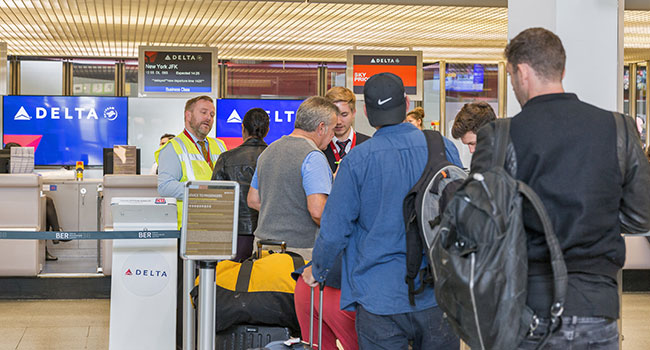
Federal Indictments in Airport Assault Case are an Important Step for Worker Safety
Last week’s announcement that three Delta Air Lines passengers face federal charges for allegedly assaulting an airline security officer and gate agent is welcome news to airport workers who have faced increased physical and verbal abuse while on the job.
According to the court filing, the passengers refused to leave a jetway at JFK Airport after they were informed that they would be denied boarding for a flight due to evidence of intoxication and improper mask wearing. The passengers then kicked and punched the security officer and gate agent, who were treated at a hospital for their injuries.
During the pandemic, agents have added to their list of duties, enforcing federal mask requirements and securing access to the aircraft from aggressive, often physically violent passengers. Alcohol consumption is often a contributing factor in passenger assaults.
“The FBI is the lead federal agency in charge of arresting those who assault, intimidate, or threaten flight crew, or endanger the safety of other passengers,” FBI New York Field Office Assistant Director-in-Charge Michael J. Driscoll said when announcing the arrests. “Anyone who thinks they can get away with this type of unruly behavior should be reminded that their actions are criminal and can result in time behind bars as a result of federal criminal charges. We are aggressively addressing this emerging threat and take all cases seriously.”
“These types of incidents are all too common, but until now federal enforcement of laws against assaulting airport customer service representatives and gate agents has been rare,” said Richard Honeycutt, vice president of CWA District 3 and Chair of CWA's Passenger Service Airline Council. “Assistant Director Driscoll’s comments are encouraging. We are hopeful that this represents a new commitment by the Department of Justice to providing clear guidance and support for airport police departments and local law enforcement agencies in responding to these violent attacks.”
CWA represents more than 20,000 passenger service agents who work for American Airlines and its wholly owned subsidiaries, Envoy Air and Piedmont Airlines. They are responsible for assisting passengers and keeping air travel on schedule and safe despite working in constant fear of retaliation from disgruntled passengers. In a recent internal survey, 230 passenger service agents reported experiencing varying degrees of physical and verbal aggression - in one case, an agent reported these incidents have become “routine to deal with.” Another agent with more than 35 years of experience as a frontline aviation employee reported being hit with luggage and was even blocked from an exit door after an exhausting 12-hour overtime shift. Across the responses, agents report these passengers are rarely held accountable when they threaten employees or endanger other passengers.
A particularly egregious incident occurred on June 28, 2021, at the Charlotte Douglas Airport when a passenger attempted to board a flight in a state of extreme intoxication. CWA gate agents, fulfilling their duties to secure the aircraft and protect the other passengers, denied the passenger access to his flight. He became extremely violent – physically assaulting a Delta employee, and verbally attacking another two. There is no doubt about what happened. Video of the assault, taken by another passenger, was obtained by local news and is publicly available. Despite witnesses and video evidence, local law enforcement did not pursue assault charges against the passenger in Charlotte, reserving court time for other cases, and the FAA and federal law enforcement, instead of stepping up to fill the gap, have likewise failed to pursue the matter.